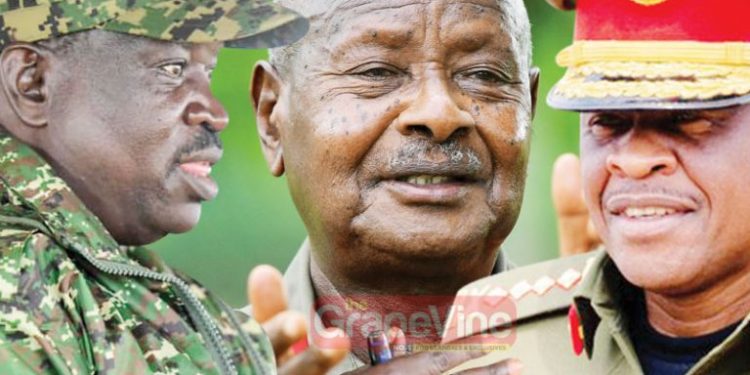By Our Reporter
Over the years, some forward-thinking Ugandans have learned to interpret President Yoweri Museveni’s intentions rather than focusing solely on his actions or statements. When the news broke last month that the military dictator had delegated overall control of the Uganda People’s Defence Forces (UPDF) to then Chief of Defence Forces, Wilson Mbasu Mbadi, not many detected any wrongdoing.
Museveni delegated command authority of the military and defense forces to Gen Wilson Mbadi on February 18, granting the Chief of Defence Forces the power to command all elements of the UPDF.
“I salute the Late Lt. Gen (Rtd) Pecos Kutesa for steering this effort as the first Chairman of the UPDF Establishment Committee and congratulate the UPDF on the launch of this milestone towards a more matured and modern force,” Museveni said in a post on X – and not many seemed to assess it based on the President’s history as a perennial liar.
Explaining Gen Museveni’s announcement left almost everyone bewildered, as many saw it as the start of reforms and transformation in the defense and military.
“Under the Establishment, the army structure will be streamlined,” Bagala said. “Manpower, equipment, and entitlements for each soldier will be streamlined.
This means logistics and the chain of command will be decentralized, with Gen Mbadi having the final authority on their operations,” as reported by the Daily Monitor.
The reorganization of the defense forces was expected to include new structures and mergers. The Chieftaincy of Military Intelligence has already undergone a transformation into Defence Intelligence and Security, which will be led by an officer designated as Chief of Joint Staff – Defence and Intelligence.
“By virtue of the powers enshrined under Article 98(1) of the 1995 Constitution of the Republic of Uganda, and Section 8(1) and (2)(a) of the UPDF Act, 2005, yesterday, on the 17th of February 2024, at the Defence Council meeting, I presented the UPDF Establishment 2021, an instrument of delegated Command, Control, and Administration, to General Wilson Mbasu Mbadi, the Chief of Defence Forces of the UPDF, to command all elements of the Uganda People’s Defence Forces (UPDF).
I salute the Late Lt Gen (Rtd) Pecos Kutesa for steering this effort as the first Chairman of the UPDF Establishment Committee and congratulate the UPDF on the launch of this milestone towards a more mature and modern force.
But for those of us who have witnessed Museveni’s conduct over the past decades, this move was certainly a zigzag one and its motive subject to speculation. President Museveni has maintained his grip on power by relying on his Banyarwanda and Bahima dominated army. Those who have challenged him along this path have met with harsh consequences, such as Noble Mayombo, James Kazini, and Aronda Nyakairima, to name a few.
Relinquishing such immense power to anyone other than himself or his son seemed suspicious right from the start. Firstly, there is ample reason to believe that Mbadi’s appointment to the CDF position wasn’t made in good faith. The government military, commanded by Peter Elweru, had just five years earlier massacred Mbadi’s people in Rwenzururu, burned the Kingdom to ashes, and imprisoned their King. By appointing Mbadi as CDF, there were potential motives.
Then, it could have been an attempt to appease the Rwenzori people, hoping to lessen their obvious resentment towards the government and the UPDF in particular, by having one of their own in a position of high command. Secondly, Mbadi was the most high-ranking army officer in the UPDF, and there may have been justifiable fears that he could lead an uprising against the government in the name of avenging his slain kinsmen. Naming him CDF would effectively dissuade him from making any hostile moves against the government, and it would also be a strategic position for Museveni to keep him under close observation in case of any such threat.
This very fact explains why, while serving as Army Commander, Elweru, who led the military actions against Mbadi’s people, was chosen to deputize Mbadi. It is no wonder that as Mbadi was being relieved of his role, he departed with Elweru, whose job was executed with what some may consider excellence.







Discussion about this post